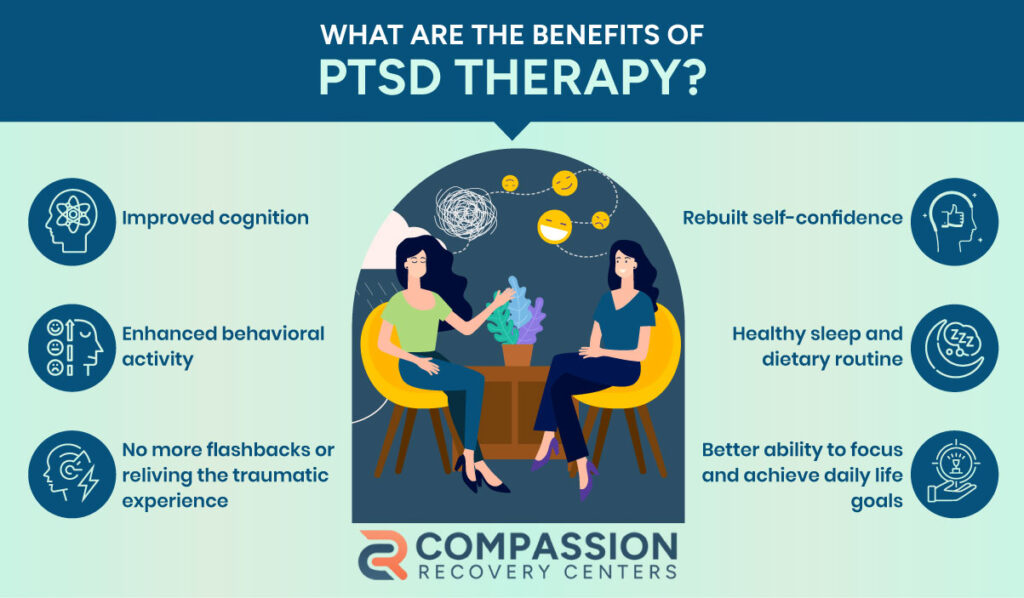If you are suffering from post-traumatic stress disorder (PTSD) and looking for a holistic PTSD therapy center to put an end to your overwhelming PTSD Symptoms. You have come to the right place.
Compassion Recovery Centers (CRC) provides the best PTSD therapy near me in California, featuring highly personalized treatment plans. We prioritize your mental well-being and help you address your inner traumas compassionately.
To give a detailed overview of PTSD therapy, this article revolves around your following queries:
- When is the right time to seek PTSD treatment?
- Which is the best center for PTSD therapy near me in California?
- How can CRC help you recover from PTSD? What makes it Unique?
- Does insurance cover your PTSD treatment program?
Our certified mental health professionals will help you relieve your PTSD symptoms most effectively. We are just a call away (877) 414-3007, or you can also reach us by filling out our confidential contact form.
All You Need to Know About PTSD
Post-traumatic stress disorder (PTSD) is a common mental health disorder that can be caused by any kind of traumatic event involving severe emotional abuse. There can be different kinds of traumatic events; however, some of the prominent ones include:
- Severe health issues
- Horrible accident experiences
- Incidences involving personal assault, like sexual assault
- Traumas associated with childbirth, and so on.
If you are also still under the effect of any previous traumas, you need to understand that you are not alone in this distressing state. The estimated statistics state that every 1 in 3 individuals who have experienced any traumatic event develop PTSD. Some other statistics regarding PTSD prevalence are:
- Approximately 5% of the US population has had exposure to PTSD, as observed in any annual period.
- Nearly 13 million individuals based in the US suffered from PTSD in 2020.
Compare Your Current State with PTSD Symptoms
Post-traumatic stress disorder (PTSD) can develop soon after a disturbing event, or it may take some weeks or even months to indicate its symptoms. The primary symptoms of PTSD are:
- Physiological and psychological reliving the traumatic experiences, like sweating, increased heart rate, and high breathing rate
- Continuous flashbacks of trauma
- Irritability
- Detachment to trauma-relevant elements
- Lack of focus
- Consistent disinterest in life activities
- Decreased cognitive abilities
- Intense behavioral issues
- Loss of appetite
- Disturbed sleep pattern
- Lack of social interaction

Which Stage of PTSD Calls for a Treatment?
To be diagnosed with PTSD, you must be suffering from:
- At least one symptom involving reliving the traumatic event
- A symptom indicating avoidance of trauma-related things
- A minimum of two symptoms revolving around cognition, mood, and behavioral issues
- Two reactivity symptoms at least
If these above-mentioned criteria indicate your current mental health state, it is high time to seek mental support. There is no need to worry once you decide to recover from emotional traumas.
Delusional pain just hurts as much as pain from actual trauma. So what if it’s all in your head?”
Tracy Morgan
To relieve yourself from PTSD, you must take the first step. You can consult us freely by calling (877) 414-3007 or filling out our confidential contact form to get your queries answered.
Top 3 PTSD Therapies: Find Out What Works for You
Currently, certain psychotherapies combined with proper medication are deemed as the front-line treatment approach against PTSD. Some of the most frequently employed elements of PTSD therapy near me are:
a) Cognitive-behavioral therapy (CBT)
Cognitive-behavioral therapy (CBT) has been considered the most successful PTSD therapy as it helps in managing the root causes of your traumas. With the help of certified mental health professionals, you can determine and modify your triggers.
Other therapies involved in PTSD recovery as a significant part of CBT are:
b) Prolonged exposure therapy (PET)
It is more oriented toward developing behavioral therapy techniques like making the affected individual recall the traumatic incident via imagination or exposure to similar triggering situations. It will promote resistance against PTSD symptoms, like recalling the traumas.
c) Cognitive processing therapy (CPT)
It helps you identify and re-analyze the thoughts and beliefs related to traumatic experiences. CPT has the potential to equip you with core skills to cope with negative thinking.
Did You know Over 8 million American adults have been suffering from post-traumatic stress disorder (PTSD).
Best Medical Center for PTSD Therapy Near Me in California
It is crucially important to get your PTSD treatment soon after the diagnosis, as PTSD symptoms may get worse with time. Moreover, finding the perfect treatment center within a narrow period becomes difficult while dealing with other life commitments.
If you are also struggling to find a top-rated center for PTSD therapy near me in California, here is a comprehensive roadmap to help you make the right choice about getting PTSD therapy at Compassion Recovery Centers (CRC).
What Makes CRC Unique to Consider for PTSD Treatment?
Offering holistic PTSD treatment services, CRC ensures enhanced mental wellness and promotes community health. Its PTSD treatment program stands out owing to the following effective PTSD therapy practices:
- Highly skillful and customized evaluations, along with free-of-cost consultations, are provided to determine the severity of PTSD.
- Evidence-based practices, like cognitive behavioral therapy, are genuinely helpful for PTSD treatment aimed at balancing both mind and body.
- Holistic therapies, such as yoga, meditation, exercises, emotional regulation, and relaxation strategies, lead to long-term management of PTSD symptoms.
Moreover, if you want to seek professional help from the comfort of your home. You can also choose to get the telehealth services offered by CRC or fill out our confidential contact form. The DHCS-certified team of mental health experts will help you explore the best PTSD treatment options for you or your loved ones. Just call at (877) 414-3007.
What do our Valuable Clients Say about the PTSD Therapy Program at CRC?
I have received such wonderful service from Compassion. The staff is genuine and sincere in the way that they want to help. You can tell there is a high level of integrity and care in their work. They don’t just look at clients as numbers. They treat you like an individual and get to know you. I would highly recommend their services.
How can CRC Aid in PTSD Recovery?
The highly qualified mental health professionals at CRC can assist you in PTSD treatment by employing the following medically approved practices:
- Recommending FDA-approved PTSD medication suitable to the severity of PTSD symptoms
- Providing one-on-one counseling for a highly personalized PTSD treatment approach
- Offering various PTSD therapies aimed at developing mind-body balance, including:
- Exposure Therapy
- Behavioral Therapy
- Cognitive Reconstructing
This PTSD treatment approach by CRC would enable you to regain your mental well-being most effectively, no matter how severe your PTSD symptoms are.
Which Insurances Can Cover Your PTSD Treatment Program?
The Compassion Recovery Centers (CRC) prioritizes your mental peace without letting financial constraints interfere with your journey toward healing. The prominent insurance options covered for the PTSD treatment programs include:
Suppose your insurance plan does not fall in the above-mentioned categories. In that case, you can still enquire about your insurance program by calling (877) 414-3007 since CRC is also connected with many other insurance carriers.
Get your question answered now.
Frequently Asked Questions About PTSD Therapy Near Me in California
Post-traumatic stress disorder (PTSD) can be pretty exhaustive at certain times. If you or any of your loved ones are suffering from PTSD and actively looking for PTSD therapy options, you might find answers to some of your important questions here:
What are the Main Symptoms of Complex PTSD?
In addition to the common PTSD symptoms, complex PTSD is characterized with certain other symptoms, such as:
- Lack of control over emotions
- Feeling lost and confused
- Lack of social connectivity
- Sense of worthlessness and guilt
- Trust issues in relationships
What Type of Therapy is Best for PTSD?
Cognitive-behavioral therapy for PTSD is considered the most effective treatment option, and it is further comprised of the following therapies:
- Cognitive processing therapy (CPT)
- Prolonged exposure therapy (PET)
- Stress inoculation training
Is PTSD Self-Treatable?
PTSD is not self-treatable. It is primarily managed by taking suitable FDA-approved PTSD medication combined with effective psychological therapies. Therefore, it is recommended to consult a mental health professional for PTSD treatment.
What is the Duration of the PTSD Treatment Program at CRC?
In most cases, PTSD therapy lasts for 40-90 days and can be divided into appropriate sessions required while keeping the severity of the mental health disorder in view.
Can You Recover from PTSD?
Yes, you can positively recover from post-traumatic stress disorder (PTSD) with the proper standard of care, suitable FDA-approved medication, and effective psychological therapies. However, the duration of recovery may vary from person to person. You may recover within six months, whereas in some cases, the PTSD symptoms may last longer than a year.
Resources
1) Overview – Post-traumatic stress disorder. NHS, UK. Available at: https://www.nhs.uk/mental-health/conditions/post-traumatic-stress-disorder-ptsd/overview
2) Post-traumatic stress disorder. National Institute of Mental Health. Retrieved on July 4, 2024. Available at: https://www.nimh.nih.gov/health/topics
3) Complex PTSD – Post-traumatic stress disorder. National Health Services (NHS), UK. Retrieved on July 5, 2024. Available at: https://www.nhs.uk/mental-health/conditions/post-traumatic
4) PTSD: National Center for PTSD. U.S. Department of Veterans Affairs. Retrieved on July 4, 2024. Available at: https://www.ptsd.va.gov/understand
5) Post-traumatic stress disorder (PTSD). NIMH, UK. Available at: https://www.nimh.nih.gov/health
6) PTSD treatment and facts. Anxiety and Depression Association of America (ADAA). Retrieved on July 5, 2024. Available at: https://adaa.org/understanding
7) Treatment – Post-traumatic stress disorder (PTSD). National Institute of Mental Health. Retrieved on July 5, 2024. Available at: https://www.nhs.uk/mental-health/conditions/post-traumatic
8) Medications for PTSD. Clinical Practice Guideline for the Treatment of Post-Traumatic Stress Disorder. American Psychological Association (APA). Retrieved on July 12, 2024. Available at: https://www.apa.org/ptsd-guideline/treatments/medications
Did You Know? According to WHO, one out of every seven teens is struggling with some sort of mental illness.










